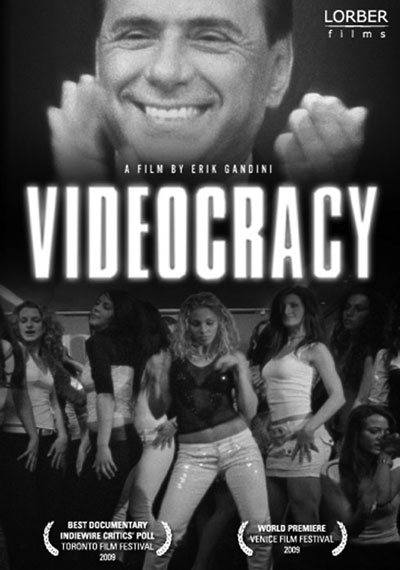Over 30 years of anarchist writing from Ireland listed under hundreds of topics
VIDEOCRACY: Broadcasting Control over the Italian Psyche - review
 Erik Gandini’s “Videocracy” is an intriguing and distressing documentary film that explores Silvio Berlusconi’s media empire, and the deep impact that it has had on Italian society and culture. Gandini’s investigative endeavour was released in 2009, but the trailers were blocked on the six main Italian television channels, which are controlled by Berlusconi. It was a tacit form of censorship aimed at obstructing Videocracy’s popularity, the alleged reason for doing so being that it was offensive to Berlusconi’s reputation. This backfired completely as the block created mass-hype about the film, and when it was screened at the Venice Film Festival it was received by a huge audience and accolades.
Erik Gandini’s “Videocracy” is an intriguing and distressing documentary film that explores Silvio Berlusconi’s media empire, and the deep impact that it has had on Italian society and culture. Gandini’s investigative endeavour was released in 2009, but the trailers were blocked on the six main Italian television channels, which are controlled by Berlusconi. It was a tacit form of censorship aimed at obstructing Videocracy’s popularity, the alleged reason for doing so being that it was offensive to Berlusconi’s reputation. This backfired completely as the block created mass-hype about the film, and when it was screened at the Venice Film Festival it was received by a huge audience and accolades.
The film is ostensibly about Berlusconi’s TV empire, built upon reality shows, and the omnipresent chauvinistic, sexified focus on scantly dressed women, which has in turn created a ubiquitous obsession with celebrity culture. The film explores this media-led hysteria in which image and appearance are everything, and most important of all the gate to money, power and fame. Gandini also focuses on the fact that in Berlusconi’s case, the image and power he built through his TV empire allowed him to enter the world of politics and run a three month political campaign that got him elected as Italian prime-minister for the first time. But Gandini goes further; he wants to find out just how deeply this screen-obsessed culture has penetrated Italian consciousness.
The film begins with afflictive scenes of scantily dressed Italian show-girls, with dark music accompaniment in the background. The first character explored is Ricky, a tragic young factory worker from the north of Italy whose dream is to make it big on TV. He sees himself as a mix between Ricky Martin and Van-Damme, but despite countless auditions for programmes and shows, all he can ever get is work as an audience-filler. He blames his inability to make it big on the fact that he is a man; and men in Italy, in his opinion, have a lot harder time becoming famous than women. For Ricky, TV is the only chance of breaking away from the sad realities of Italy’s socio-economic barriers, the only chance of being someone that means something. The film moves on to look at Sardinia’s Costa Smeralda, the coastal area that is Italy’s ultimate VIP capital. Lele Mora, Italy’s top celeb agent and Berlusconi’s close friend (now in the middle of the Rubygate sex scandal investigations) is interviewed at his lush villa, where he reveals his praise for Berlusconi and his obsession with Mussolini. During the interviews his vast poolside and garden are inhabited by Big Brother and I’m a Celebrity Get Me Out of Here stars who have made it big thanks to Mora’s power to transform people into VIPs. The final character that Gandini investigates is the squalid paparazzi boss Fabrizio Corona. Corona was once Mora’s right hand man, but his money-obsession led him to become the man with a monopoly over paparazzi in Italy. He however, does not usually sell compromising images to gossip magazines, he blackmails the very celebrities in the photos and sells the images back to them for extortionate prices (which shows just how much image matters, and costs, in Italy). He defines himself as a modern Robin Hood, one who “steals from the rich, to give to himself”. All throughout the film, snippets are shown of the programs that Berlusconi has fostered throughout the years, mindless reality shows, programs where mother-in-laws choose the perfect wife for their thirty-something sons based on how well they clean the house, and how good their cooking is. Whatever the shows, women are objects and ornaments, their bodies talking to the minds of Italy, their mouths not saying much.
Videocracy is a poignant analysis of Italy and the principles that guide it. Berlusconi receives criticism daily for his dodgy fiscal dealings and most recently for the sex scandals he is involved in. Videocracy however digs far deeper as it successfully attempts to uncover just how powerful Berlusconi is, and the devastating effects that his empire has had on the minds, lives and aspirations of Italians. Gandini says “You get a picture of a generation which is very very obsessed by brands, by their own appearance, not interested in politics so much, nor in the world... You have a country which is culturally caught in a bubble of values which are what I call a videocracy, where image is everything”. Gandini explores how Berlusconi’s thirty year monopoly over TV broadcasting, his ownership of important newspapers and the most popular gossip magazines (of which 120 million are sold annually in Italy) has created a society in which the lines between reality and fantasy have become strangely blurred and warped. Without television and the mass trash-culture that it broadcasts daily to millions of Italians, this form of control over the consciousness of Italians, and silent guidance of their desires, would not have been possible.
 This article is from Issue 3 of the Irish Anarchist Review - published May 2011
This article is from Issue 3 of the Irish Anarchist Review - published May 2011

